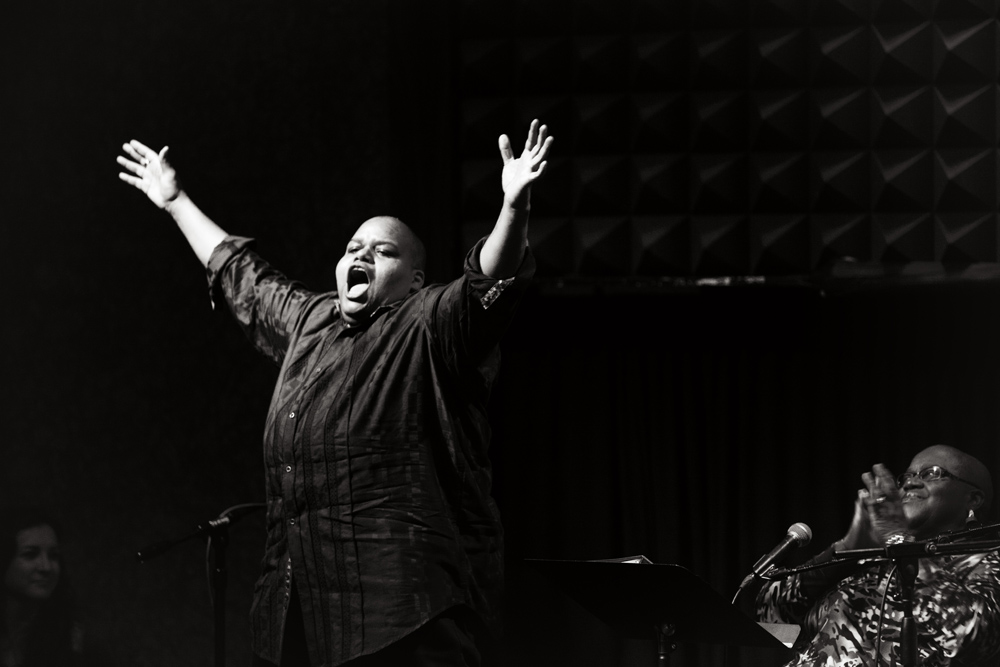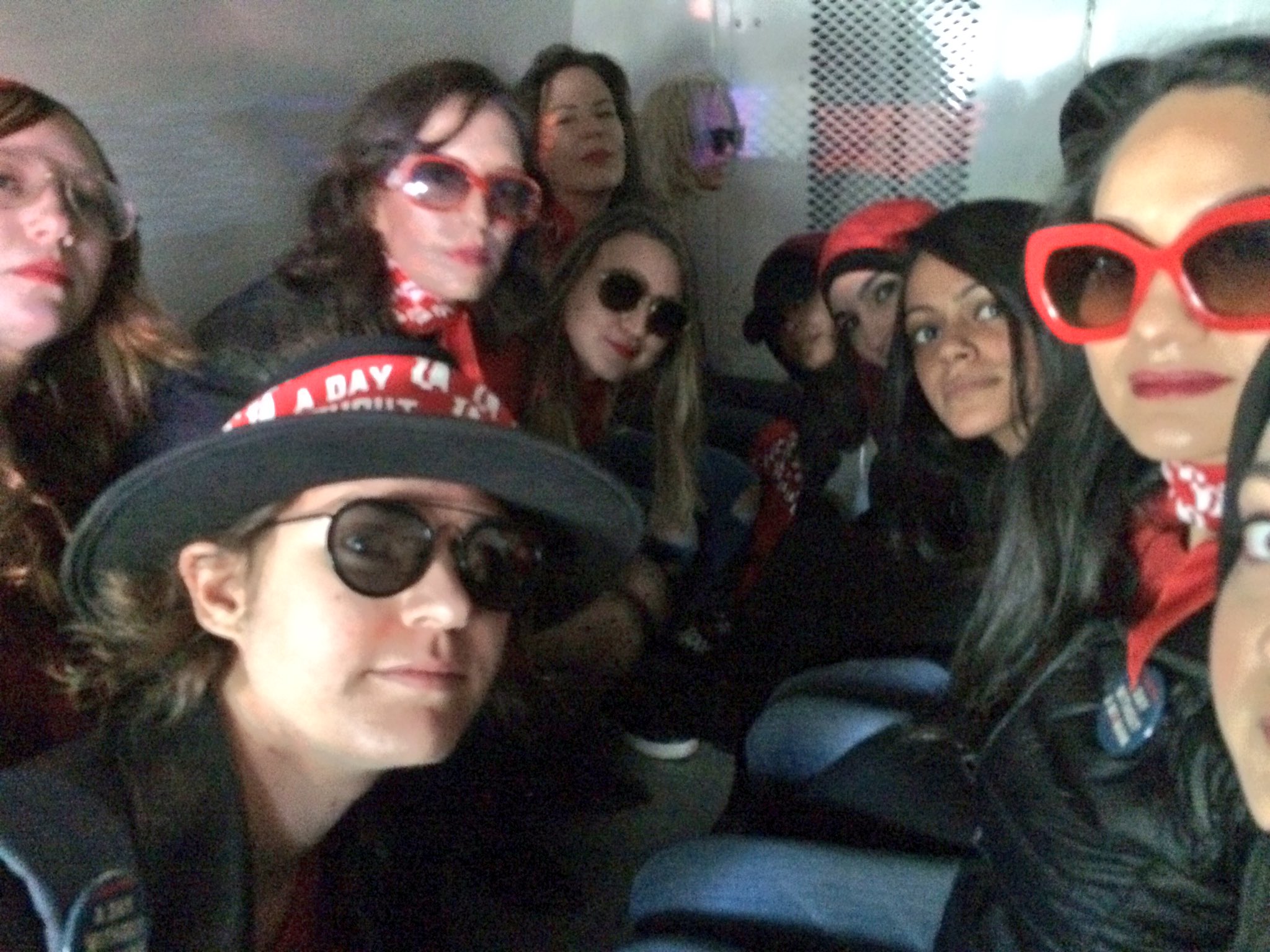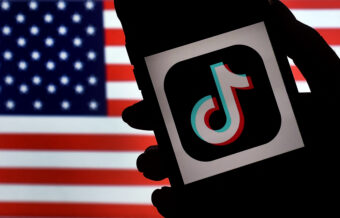Toshi Reagon is known as a political musician, but her most consistent topic is love in all its forms. Her whispery, acoustic version of The Cars’ “Just What I Needed,” (Toshi, 2002), brings a romantic depth to the tune that was barely hinted at in the pop version. “Darling” (The Righteous Ones, 1997) is so hopeful about the possibility of love that it played during a pivotal scene on Felicity. And then there’s her frank appeal for some “unbelievable nasty nasty” in “Real Love” from the same release.
Her political reputation is deserved, however. Those love songs are defiant when sung by a queer black woman. The anti-war dirge “Ballad of the Broken Word” reveals a painful emotional response to current events. Reagon’s onstage banter is likely to be about prison reform, voting, slavery, or sexism, and the concerts themselves are likely to be benefits for incarcerated women, LGBTQ centers, or other causes. Though she’s been around since the early 90s, and toured with Lenny Kravitz in her twenties, Reagon is just beginning to get more widespread recognition due to near-constant touring and a soulful performance at the Women’s March on Washington.
She’s a living legacy of the civil rights movement. Her parents, Bernice Johnson Reagon and Cordell Hull Reagon, were both involved with the Student Non-Violent Coordinating Committee (SNCC) and founding members of The Freedom Singers, a quartet that sang old spiritual music with updated political lyrics. Bernice Reagon went on to found Sweet Honey in the Rock, an acapella group whose musical territory includes immigration, domestic violence, and war. They performed at the White House during the Obama administration’s first celebration of Black History Month.
Reagon’s music reflects a relentless exploration of genres, resulting in a sound that ranges from blues to folk to soul to country to rock, and even a little bit of punk. Having an uncategorizable sound is itself a form of resistance in her mind: “People are very obsessed with trying to say what my music is because they’re trying to sell records and think that’s the best way to sell it,” she says.
I spoke with Reagon as she was in the midst of rehearsals for Parable of the Sower, an operatic version of the Octavia Butler novel about a dystopian future created by colliding conflicts over race, gender, resources, and other all-too-familiar current issues.
At the Women’s March, the final song you and the other musicians performed was “Ella’s Song,” which was written by your mother using words from the great Ella Baker. It’s a beautiful song, and it’s still painfully relevant—in particular, the lines about how we cannot rest “Until the killing of black men, black mothers’ sons, is as important as the killing of white men, white mothers’ sons.” Was there a part of you that thought, “I can’t believe we are still doing this?”
No. If you know the history of this country, it’s only a small amount of time that we have been working on non-violence and on respecting each other and the planet as a whole. America was not based on equality and it wasn’t based on justice. It is based on ripping off land from indigenous people, which is outright gruesome, and horrific murder, and rape of the women that were here, and then the torture, kidnapping, horrific of tradition of slavery. People don’t know their history. When you know the real story, you realize how powerful it is that a movement for justice is coming out of that horrific legacy.
Do you see a solution in this new surge of political activism that’s happening? You were at the Women’s March on Washington.
I didn’t think three to four million people worldwide were going to participate in the much. But this didn’t just start with Trump. For the last 10 years, people have been activating all over the planet. The Women’s March was an opportunity for people to realize, “We’re not here by ourselves.” It’s time for people to be outraged and make hard decisions about what they’re going to do and connect in communities like never have before. It’s time for everybody to do some push-ups, and some sit-ups, and eat right for the long battle that this is going to be.
I live in New York, and I am surrounded by so many activists and so many amazing people organizing. Some of them run organizations, and some of them are grassroots, and some are independent. I imagine there are people like that all over the country. I think that a great movement connects all of us.
If you were in charge, what would you do to change the world?
I keep saying, “Let’s make women the center of the universe like they’re supposed to be.” We would do amazing things. Too many of our leaders on the planet are men–men who don’t like women and who have created a system literally against the bodies of women. Men are fucking ruining the world in a systemic way and they have decision-making power around issues of the environment, issues of incarceration, and issues that concern every human on this planet. Until our beautiful, amazing brothers get together and make a decision to unarm themselves and stop violating the bodies of other humans, we are not going to win. We’re only going to get so far and then we’ll have to turn around and start over again. That is just the truth. I love my brothers. I love men. I have no hate for no type of human, but I see a lot of men trying to harm me and I’m over it. I’m just fucking over it and I’m done.
What should men be doing, if anything?
I have just started saying to my brothers—and I have many—that I need them to show up more in a particular way and a very pointed way. Like, your silence is not okay. There was a post going around about how men should get to decide if their wives can have abortions–a thousand men should have sent that to me before any women did. My brothers support me in so many ways, but I’m asking them to do more. I’m asking them to relate to each other around these issues, and I’m asking them to take some personal responsibility. When I say brothers and sisters, I am including trans people and gender nonconforming people, because it is really important that people see that trans people and gender nonconforming people are vulnerable in the face of this destruction.
For a real revolution, we have to get these weapons out in the hands of these men on the planet. Because, at the end of the day, the next thing is going to be them wanting to shoot each other or shoot us. Having Trump in the White House is the same as just having somebody with a lot of weapon pointed at you and just waiting for the day they decide to engage it. I will never understand the election of that man. After Obama, it was the biggest slap in the face. I think it showed every person or color of where we actually live. We live in a place where white people will allow us to live under the constraints of a man who literally said, “I will make these people suffer: women, Mexicans, black people, Muslims…”
One issue you’ve been very connected to is the incarceration of women. Did anything in particular bring that up for you?
A lot of things converged at one time. I provided some music for the movie Out in the Night, which is about the unjust sentences handed down to the New Jersey 4. I was doing a lot of events and readings with formerly incarcerated women. And more and more conservative Republicans were coming to power. These guys came right out of the gate wanting to regulate women’s bodies–cutting healthcare, restricting abortion.
But I also noticed that they were legally redefining things in the justice system in ways that criminalize women. We had cases where women were jailed because they put their kids in a school system that wasn’t from their neighborhood, or being jailed and losing their babies because they took drugs once or something. I was like, are you fucking kidding me? Black women, women of color, and poor, working class women are incredibly vulnerable. It’s a horrific situation. The rates of women being incarcerated just go up and up and up. It’s like, what do you want? Do you want a system for slavery and abuse, or are you really interested in helping someone who did something wrong?
So much of this is because people don’t know their rights. You should know your rights, and you should know what power people have over your body once they think you’ve done something wrong. We don’t know the law and we don’t know the judicial system and we get caught up in it. If you want an example, go see Out in the Night because your mind will be blown.
We haven’t even talked about music yet. Who are you listening to these days?
I love Janelle Monae. I love Beyoncé. She accomplished the dream of becoming a pop star, and then she kind of turned a corner and … I love those last two albums. When my daughter was little, I was looking for music to play for her, and I said, “Okay. You can listen to Beyoncé.” We also listened to Destiny’s Child. I didn’t mind playing her sexy music, I just talked to her about everything she was hearing.
I also really love the work of Meshell Ndegeocello. I was in a show she did called “Can I Get a Witness? The Gospel of James Baldwin.” I think that show might have saved my life. It’s kind of church service, but with James Baldwin’s The Fire Next Time as the Bible. A brilliant, brilliant, brilliant work. I love Kendrick Lamar. His music is not necessarily political, but it’s so freaking sexual. It’s cutting a path–if that path had been cut when I was a kid, we’d be in a different place. I love that kind of work. And then, of course, I love my friends: Morley, and the duo Climbing PoeTree, Be Steadwell, and my long-time friend and collaborator Carl Hancock Rux. There are so many great people.
Your last record was 2011—when are we going to get a new one from you?
I have enough material to put out of record but not the time to execute its release the way I want to. I decided I’m going to just start putting out songs, without the container of an album. So there’s that, and a project I have with Allison Miller called Holler and Bam. That will be coming out in the spring. There’ll be a lot of Toshi music happening in 2017.
Correction: This piece originally stated that Toshi Reagon opened for Lenny Kravitz at the age of 17. It has been updated to reflect that Reagon instead opened for Kravitz while in her twenties.





